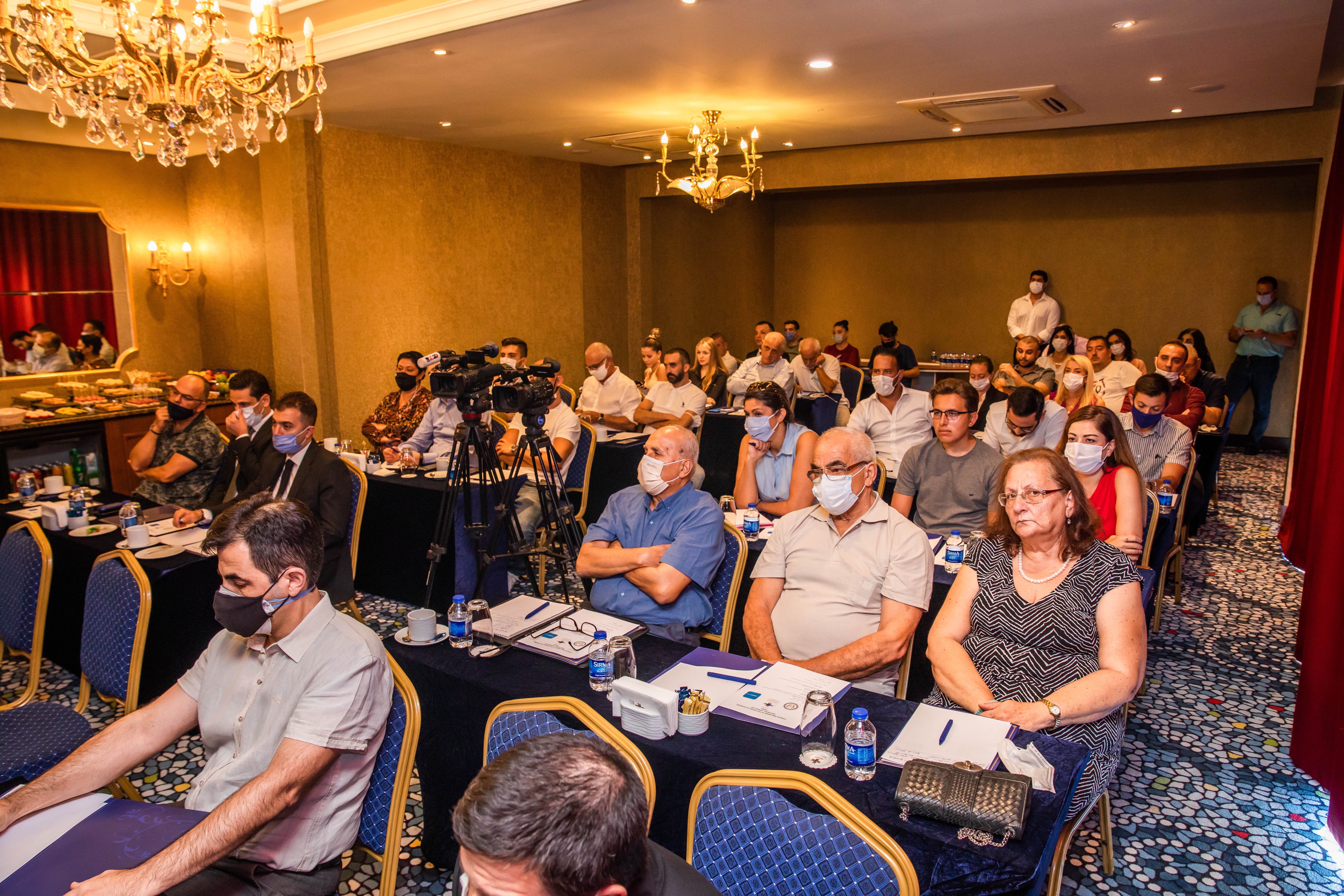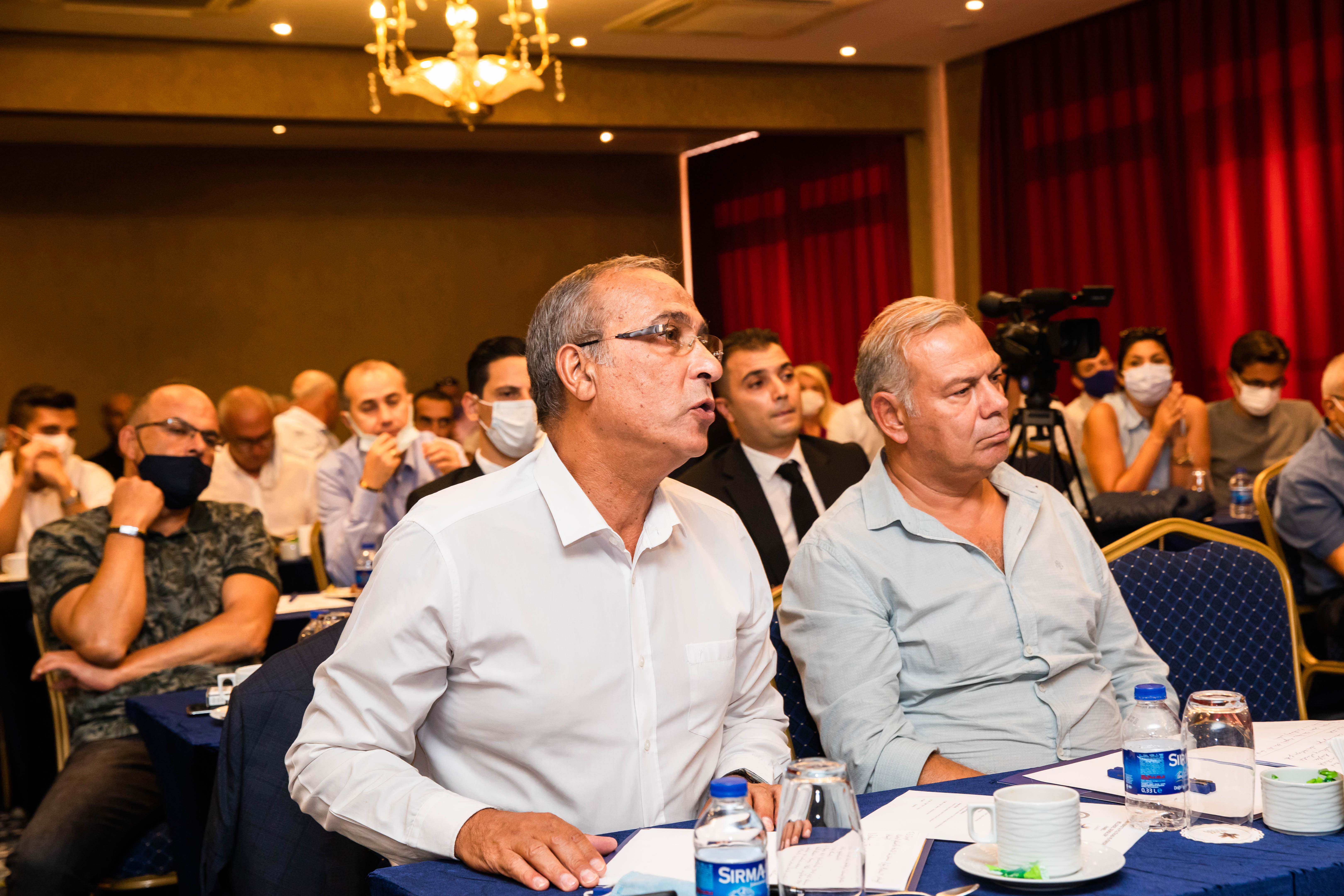List All News ArticlesJoint Panel from EMU CPC and Euro Politics Journal and the Eastern Mediterranean Association
Published Date: Friday, 13 August 2021
A panel titled “Turkey's New Policy in Cyprus and Global Regional Balances" was held with the cooperation of Eastern Mediterranean University Cyprus Policy Center (EMU KPM), Euro Politics Magazine and Eastern Mediterranean Policy Association and the main sponsorship of Merit International Hotels. Participating at the said panel held in Kyrenia on Friday, 13 August, 2021 were the Former Prime Minister of the Turkish Republic of Northern Cyprus (TRNC) Ferdi Sabit Soyer, National Unity Party Nicosia Deputy Hasan Taçoy, the People's Party President and Nicosia Deputy Prof. Dr. Kudret Özersay, Retired Ambassador Daryal Batıbay, EMU CPC President Prof. Dr. Ahmet Sözen and Dialogue Media Group Editor-in-Chief Reşat Akar.
Solution Policies Evaluated
EMU CPC President Prof. Dr. Ahmet Sözen emphasized that the uncompromising stance of the Greek Cypriot side was effective in Turkey's return to the two-state solution policy. Prof. Dr. Sözen stated that he was not sure whether this policy change was really a break from the traditional Turkish foreign policy or was part of a tactical strategy that would force the Greek Cypriot side to a bi-communal federation, and that he thought the timing of the new policy was made at the most wrong time, considering Turkey's image in the international community. .
Former Prime Minister of the TRNC Ferdi Sabit Soyer stated that for the first time in history, with the 1960 Cyprus Republic Treaties, the Turkish Cypriot people were given an equal social status in the future of the island, and Turkey was given a position with the right to be a guarantor in determining the future of a geography outside the borders of the National Pact after the National War of Independence. Soyer said that Turkey is the guarantor of the island's territorial integrity and constitutional order, and that it is not clear where it will stop if it starts to ignore these principles, and that it has already taken the United Nations (UN) against it.
National Unity Party Nicosia Deputy Hasan Taçoy reminded that today a new opening is mentioned, and in fact it is not new, and that the joint declaration of 11 February 2014 includes the transition to single sovereignty and single citizenship formed by the emerging sovereignty of the Turkish Cypriot State and the Greek Cypriot State. Taçoy stated that the Greek Cypriot administration will never accept the disruption of an administration governed by the Greek Cypriot side alone in any way and make the Turkish Cypriot people partners in the rotating presidential system.

Diplomatic Methods Discussed
People's Party Nicosia Deputy Prof. Dr. Kudret Özersay pointed out that from 1968 to date, all diplomatic methods with different techniques and in different places have been tried and exhausted with the participation of leaders from different political views. Prof. Dr. Özersay said that the Greek Cypriot political leadership said that they were ready to discuss a different solution with their own opinion and that the UN could say "If you have a different solution proposal, let's talk" for the first time, but that the Turkish side does not consider the status that can be achieved with a solution as a precondition.
Reşat Akar, Diyalog Media Group Editor-in-Chief, stated that Turkey's policies regarding Cyprus are unstable, that the Turkish Cypriot Federated State, which was established in 1975, was not seen as a separatist anywhere in the world, and that the 1977 and 1979 Peak Agreements could be signed because of this. Akar went on to state that with these agreements, the solution of Varosha problem has been considered as a priority, while today's discussions focusing on whether Varosha is Varosha Foundation property are actually self-deception and an attitude towards domestic politics.
Retired Ambassador Daryal Batıbay said that the political inequality that emerged in Cyprus in 1963 has grown stronger against the Turkish side. Batıbay said that while the Greek Cypriot side entered the European Union on behalf of Cyprus, the increase in Turkey's problems with the West and its regional isolation provided a wide area of action for the Greek side, and that instead of talking about the federation, the Greek Cypriot side is trying to transform the Cyprus to a problem not between the two communities on the island, but a problem of the Turkish side with the West. He added that the Greek Cypriot side also tries to maintain this status quo that works in their favor.

Varosha Issue Discussed
EMU CPC President Prof. Dr. Ahmet Sözen mentioned that it is possible to solve the Varosha issue with a comprehensive solution, under the umbrella of the UN, with UN resolutions or by effectively running the Immovable Property Commission, without taking the cases to the European Court of Human Rights. Prof. Dr. Sözen stated that he believes that a comprehensive package containing the opening of Varosha, direct flights to Turkish Cypriots, hydrocarbons and the opening of Turkey's sea and airports to the Greek Cypriot side will contribute to the solution.
Former TRNC Prime Minister Ferdi Sabit Soyer said that the main magic word is a mutually acceptable solution model that depends on UN parameters, includes political equality and two constituent states with two regions. Soyer pointed out that the Varosha issue should be handled in a coordinated manner with the UN, through respecting international law. The status and legal security of the people who will come here and operate their properties, how they will participate in the administration and which administration mechanism they will depend on should be well planned.
Pointing out that an example of the Varosha issue is the lawsuits filed against foundation properties in Egypt, National Unity Party Nicosia Deputy Hasan Taçoy said that it is essential to open this place both in order to return back the rights to those who lost their rights and to ensure economic developments. Taçoy said that this opportunity provided to individuals should be taken one step further and their rights should be made more applicable, more visible and more livable.
Highlighting the fact that instead of an approach that categorically rejects any other form of partnership, a description of cooperation without harming the status of the parties to each other can be a much more realistic and much more applicable model, People's Party Nicosia Deputy Prof. Dr. Kudret Özersay said that this cooperation model can be shaped, for example, through an international unofficial natural gas conference or international companies. Prof. Dr. Özersay stated that he thinks that such a cooperation will lead to the formation of trust over time and that it can lead to an evolutionary partnership.
Dialogue Media Group Editor-in-Chief Reşat Akar, on the other hand, stated that despite the Summut Agreements, which stated that neither ENOSIS (annexation to Greece) nor a partition to Turkey is possible, a solution has not been reached, due to the fact that both parties actually evaluate the solution in their own internal fronts in line with their political interests. Akar said that he can see what we are experiencing right now, that the policy of playing to the inner tribunes was a blow against us, and that in fact, Turkey needs to develop policies that would compel the Greeks to a federal solution.
Retired Ambassador Daryal Batıbay questioned whether “We can change the status quo with unilateral behavior or not?". Batıbay said that the Immovable Property Commission should be used to Turkify and expropriate Greek-owned properties, that Maraş should be transferred to the Commission by removing it from being a military zone under Turkish rule, and that Maronites should be allowed to return to their villages. Batıbay drew attention to the need for a short-term, non-open-ended negotiation process in which the restrictions on the Turkish side will be lifted if there is no compromise.
.jpg)